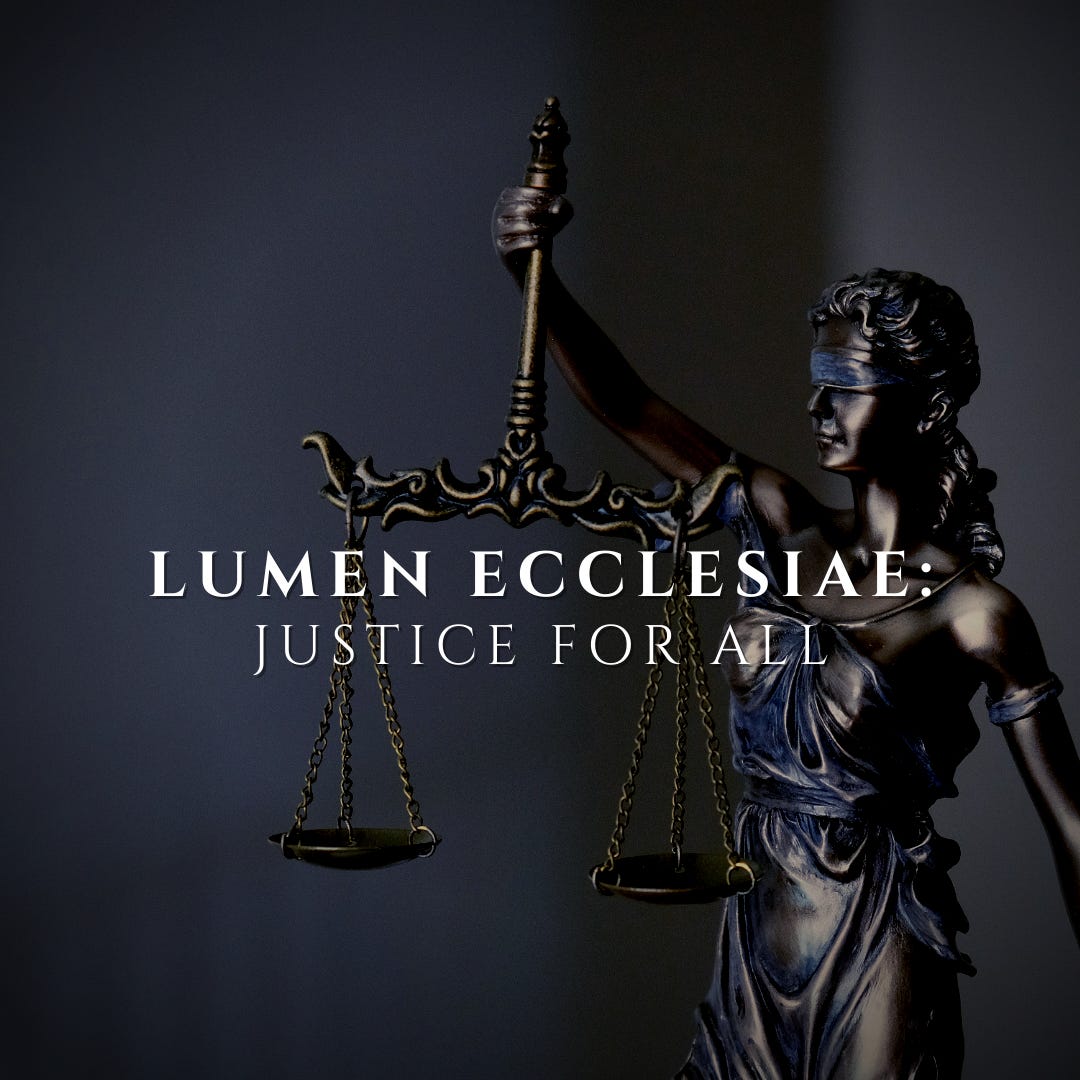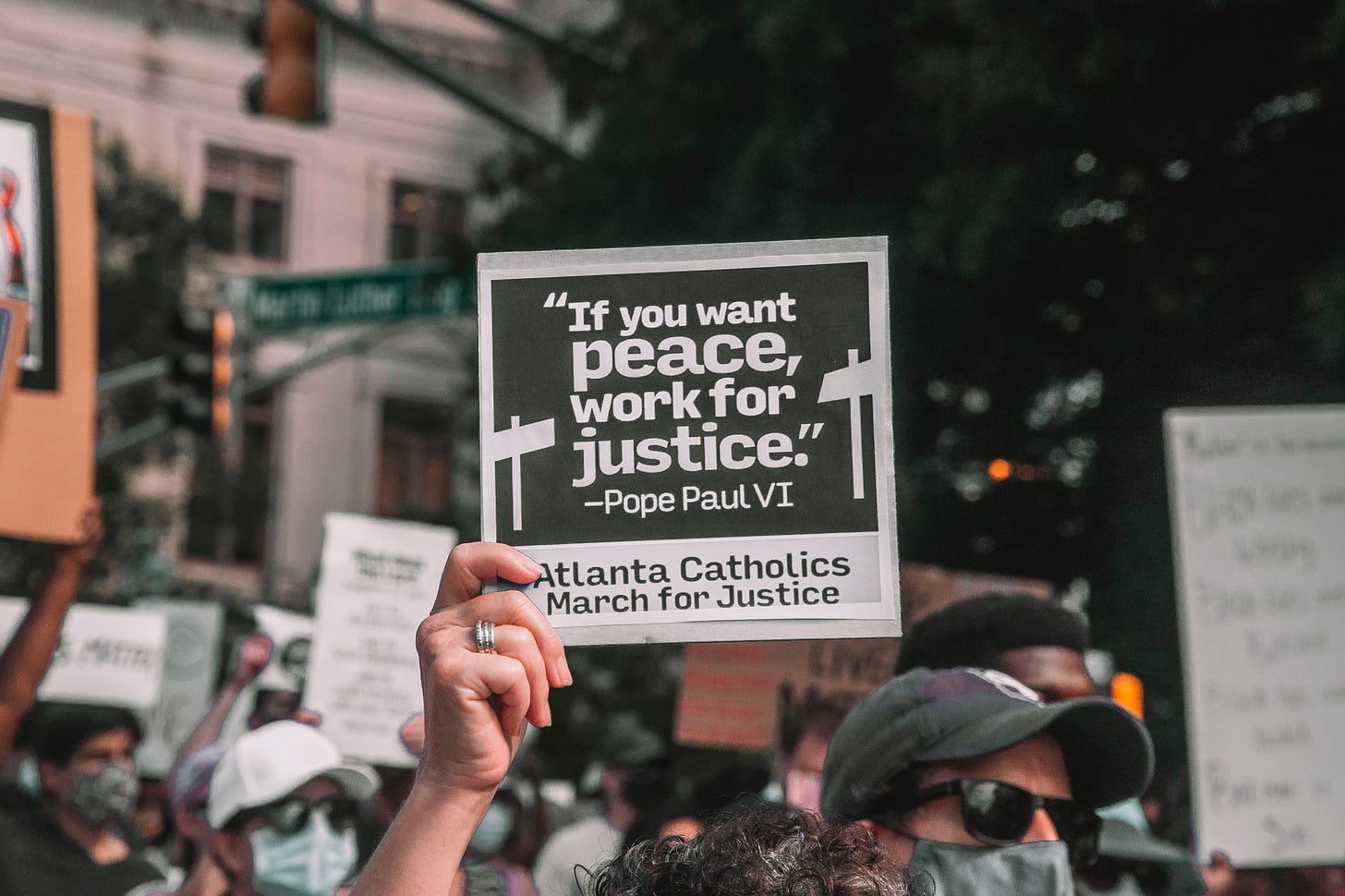Running Towards Virtue | Justice
Everybody is talking about justice, so what is it?
So far we have discussed our innate human freedom for excellence and the virtue of prudence, both of which deal with intrinsic realities within us primarily.
Now we turn to the virtue which governs our relationships with the external world and our neighbors: the virtue of Justice. Justice is the virtue which strives to maintain us in right relationship with others. As such, justice is constitutive of living the good and happy life.
Even as little children we know the importance of justice. Take a toy from one child and give it to another and you will quickly hear the age-old cry “that’s not fair.”
And even though I can hear in my mind my dad’s famous reply, “nobody said life was fair,” a part of us knows that it should be fair, it should be just.
We know, even as children, that there is such a thing as right and wrong, just and unjust and we want that justice for ourselves.
However, what exactly constitutes Justice?
Basically, if we are to look at the at the Catechism, CCC 1807, we would see that Justice is:
“The moral virtue that consists in the constant and firm will to give their due to God and neighbor. Justice towards God is called the virtue of religion.
Justice toward men disposes one to respect the rights of each and to establish in human relationships the harmony that promotes equity with regard to persons and to the common good.”
Justice first emerges when we encounter another, someone other than ourselves with rights and powers which are outside of us and whom we cannot absorb or control.
This other is most fundamentally another person, our fellow man, but also might be the State and, most importantly, God himself.
While we will not speak much about the virtue of religion as a subset of Justice in this post (another time, folks!) it is enough to say that God is owed something because he is God.
The best way to give justice to God is through sacrifice, prayer, thanksgiving, petition, and adoration. All of which can be seen mostly clearly in the Sacrifice of the Mass. When we reverently and actively participate in Mass, we are acting justly toward God, offering him everything he is due and the only thing he desires: our very selves.
Now back to earth.
Justice is basically the constant habit of recognizing the rights of another under any and all circumstances. This is why Prudence, which we discussed earlier, is so important. We have to be able to see rightly in order to know and to respect the rights of another.
While giving God his due as Creator is of primary importance, I want to focus on the three types of Justice which we can find here on earth and in our relationships with society and other individuals.
Commutative Justice
This type of Justice regulates our relationships with another individual, one-on-one. If someone steals from you or disparages or gossips about you behind your back, they have violated commutative justice.
Let us say that you angrily yell at your best friend after he or she gives you some unwanted dating advice.
You proceed to call them a meddler, a busybody, and a number of other vulgar terms. In your anger you have damaged your relationship with your best friend and violated the standard of commutative justice.
A necessary act of reparation and apology is required to restore justice at this level, but if we can swallow our pride, justice can be restored.
Straightforward right? But what about when it’s not an individual but the State or society? Well, that’s distributive or maybe even legal justice.
Distributive justice
Distributive justice is the virtue which regulates our rights as members of a society and includes both our natural rights (such as life, liberty and the pursuit of happiness) as well as acquired rights (such as the right to vote).
This type of justice specifically deals with how the State or society is supposed to be just to and towards us as members of it.
The central purpose of the state can be found in the concept of distributive justice. It is the role of a state and society to ensure that common burdens and privileges are distributed equally among members, that every citizen is able to exercise both natural and acquired rights without undue interference and to foster mutual unity and relations among all citizens.
For example, as a citizen of the United States of America, I have the right to vote in an election and it is the responsibility of the state to ensure that I am able to do so without undue interference. It is also my right to live in the land and be secure and at peace. To the extent that the state and society make this possible, we can say that the State is just.
While many today might say that all rights are social inventions, as Catholic Christians we know this to be false. There are natural rights which cannot be taken from us by any state or power and which are ours by virtue of our being human, such as the right to life.
An important note at this stage: When we speak of justice we often make note of our rights but forget to mention our obligations. There are privileges as well as burdens which are part of justice, especially when considering distributive justice.
For example, I have the responsibility as a member of this society to pay my taxes, terrible though that may seem at times. The state also has the responsibility to ensure that I pay what is a just amount given my occupation and that I am not taxed unduly.
As you think about distributive justice you can likely imagine any one of a dozen scenarios where the state has failed the standard of justice, whether we are speaking about unfair taxation, racial bias among police, or the life and security of the unborn and the elderly, we can see the cracks in the image of justice very easily.
Legal Justice
Another important aspect of justice is that of legal justice. This is when society, justly and rightly, requires something of us for the common good and the welfare of our neighbor.
Distributive justice was concerned with the State’s actions in preserving our rights, now in legal justice, the attention turns towards us an our actions. You can see how closely tied legal and distributive justice are to one another, both essential to our lives as members of a larger society.
Legal justice can be seen clearly in many regulations, statues, and laws and is relatively common and straightforward. Traffic and fire regulations, military service in time of crisis, anti-smoking or pollution laws, taxes on imports and exports, etc.
The state, in order to carry out distributive justice, requires certain duties from me and legal justice is my acceptance of those things ordered as they are to the common good of society.
Now, I have named and summarized rather quickly three kinds of justice, but there is a fourth which is bandied about by many and has become a buzzword for many: social justice.
While I find the intention behind the terms social justice a good one (the desire for the improvement of society and the structures of the state for the good of all citizens) I also find the terms less than helpful and honestly unnecessary.
Justice is by definition concerned with society and the improvement of the social order and the harmony of all men and women. Social justice as a term seems redundant.
For example, when an employer fails for any reason—such as sex, race, ethnicity, or social class— to offer a fair and just wage to a worker he has committed an injustice.
Imagine the scenario where an employer fails to pay a Black woman a fair wage for her labor.
Commutatively, the employer has failed to give the worker what is hers by right, aka payment. On a basic level, an injustice has been done on an individual level.
Distributivity, the State has promised and is called upon to insure that all members of society, regardless of sex, race, or any other factor, have their natural and acquired rights preserved from harm. Thus, if the employer is paying her less because she is black and a woman, the employer is doubly and triply unjust!
Finally, the employer entered into a legal agreement with the woman at the time of employment and the State also has statutes and ordinances in place to deal with employers who fail to honor said agreements.
Simply put: justice is a necessary component of living a good life at all. We cannot, and are not called to, manage through life on our own. We are called to enter into right relationship with others, with society, and with God himself.
It is only the just man or woman who recognizes that we are by necessity in relationship with one another.
It is only the just man or woman who sees and acts so as to give what is due to each and who not only knows their own natural and acquired rights but their obligations as well.
And it is only the just man or woman who is able to help rectify disparity and injustice of any kind—racial, economic, sexual—through his or her own liberality, truthfulness, empathy, and generosity.
As we look at our own lives, it is easy enough to see how we have failed at justice. We fail every day. But we are called each day to renew ourselves in the task of justice, a task which our God in Sacred Scripture has given to each of us.
“He has told you, O man, what is good; and what does the Lord require of you but to do justice, and to love kindness, and to walk humbly with your God?” (Micah 6:8)
“Learn to do good; seek justice, correct oppression; bring justice to the fatherless, and please the widow's cause,” (Isaiah 1:17)
“Give justice to the weak and the fatherless; maintain the right of the afflicted and the destitute,” (Psalm 82:3).
“But woe to you Pharisees! For you tithe mint and rue and every herb, and neglect justice and the love of God. These you ought to have done, without neglecting the others,” (Luke 11:42)
Let us call to mind these, and many more, verses of Scripture which seek to remind us of the central importance justice plays in our lives and relationships. And let us also ask for the intercession of Mary, the “Mirror of Justice,” so that we might be perfectly converted and conformed into the image of Jesus Christ, the Just One who was slain for our sake.
“Thy justice is justice for ever: and thy law is the truth” (Ps. 118:142)
We have skimmed only the very beginning of what it means to be just and the nature of the Virtue of Justice, so here are a few resources for further reading:
-CCC 1807
-Josef Pieper, “The Four Cardinal Virtues”
-Benedict Ashley, OP, “Living the Truth in Love”
-Francis Cunningham, “The Christian Life”
-Wiliam C. Mattison III, "Introducing Moral Theology: True Happiness and the Virtues”



